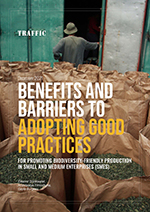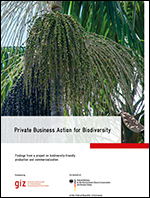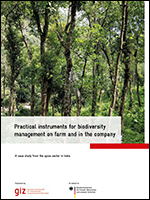Increasing motivation for nature positive change

After six years, the IKI project Private Business Action for Biodiversity (PBAB) draws a conclusion on its work.
Over the past six years, IKI´s global Private Business Action for Biodiversity (PBAB) project has been pilot testing and further developing instruments to promote biodiversity-friendly production and commercialization. In four pilot projects, the PBAB together with partners from the private and public sectors has implemented promising instruments and tools, prioritizing Small and Medium-sized Enterprises (SMEs).
Furthermore, it addressed key questions at global level, such as “How to increase motivation to switch to biodiversity-friendly production and marketing?”, and “How can funding be used for a biodiversity-friendly future?”
Biodiversity and the role of the private sector
Businesses play an essential role in combatting the causes of biodiversity loss. The importance of biodiversity and concern about its loss has increased globally during the past six years. Among others, integrating biodiversity into business strategies has become a topic of growing interest. Financial institutions show a growing commitment for the conservation and sustainable use of biodiversity.
New coalitions, platforms and networks are working for biodiversity by sharing one goal: engaging the private sector to take action on biodiversity. In the development of the Post-2020 Global Biodiversity Framework (GBF) of the Convention on Biological Diversity (CBD), the private sector and its stakeholder organisations emphasise their role as an important actor for biodiversity conservation.
Contributions at global level
To reinforce positive trends at the global level and contribute to the current debate on biodiversity, the project has addressed current issues. These include the design of green economic recovery programs (green recovery), the creation of "green" jobs, the financing of biodiversity conservation and the involvement of financial institutions as well as supporting SMEs.
The project brought together experts and decision-makers from different continents, including representatives of governments, non-governmental organizations (NGOs), indigenous peoples and the private sector in conferences and workshops. They discussed key issues to jointly support new solutions for the conservation and sustainable use of biodiversity. The results were published and fed into the international discussion.
Integrating biodiversity into business – four examples
To maintain and reinforce the positive trends on global level, we need effective instruments that promote, disseminate and scale promising approaches for biodiversity-friendly production and commercialization. Therefore, the PBAB project identified new and existing instruments, tested and further developed them in a total of four pilot implementations.
Carnauba, Brasil
The carnauba palm is an endemic plant vital for soil preservation and water storage and grows in a highly biodiverse ecosystem, the Caatinga biome in northeast Brasil. Wax extracted from carnauba leaves is found in a huge variety of everyday products from car polish to cosmetics to candy. Environmental and social challenges have come to light in Carnauba wax extraction areas, including degradation of local biodiversity, deforestation, persistent drought, rapid expansion of invasive species, poor working conditions and low pay.
With the objective to promote more responsible production that respects people and biodiversity, the project helped establish a multi-stakeholder partnership called the Initiative for Responsible Carnauba (IRC). It developed a set of Good Agricultural and Collection Practices (GACP) and supported the adaptation of internationally recognized biodiversity standards for the Carnauba sector, among other activities. The Initiative, under the lead of the Union for Ethical Biotrade (UEBT), continues as a private sector action platform to improve the productions schemes, promote innovation, and take care of the natural environment.
Açaí, Brasil
Açaí palms are native to the Amazon and northern South America. The açaí berry is processed and sold as frozen pulp, juice, and powder or used in various products from beverages, smoothies, foods, cosmetics, and supplements. As the global demand for the fruit has expanded in the last ten years, amazonian ecosystems are increasingly under pressure. The project supported the development of a new procedure on ecosystem services by the Forest Stewardship Council (FSC) to measure biodiversity impacts within forest management certification, together with the Amazonbai cooperative. The procedure helps producers to show the positive impacts of açaí management in biodiversity conservation and CO2 stocks.
Spices, India
The Western Ghats in India have been listed among the world´s most important biodiversity hotspots. At the same time, they are one of the main areas for spice cultivation. Changes in agricultural practices put spice production at risk and lead to the destruction of biodiversity and the environment, aggravated by the consequences of climate change. With the objective to improve awareness and build capacities, the project developed training opportunities regarding biodiversity-friendly production and commercialization.
Together with key partner institutions from India, the Global Nature Fund (GNF), the Union for Ethical Biotrade (UEBT) and others, the project worked on improved tools for implementing biodiversity friendly systems among Indian spice producers and SMEs. These tools, namely the Biodiversity Action Plan (BAP) approach, Biodiversity Assessment and the BAP-Monitoring Tool (BAP-Monitor), have been well accepted among stakeholders in the Indian spice sector.
Agaves, Mexico
Agaves are a group of plants of which 70% of species are native to Mexico. They are used to produce fibre materials, sweeteners, fermented beverages such as pulque and highly popular distillates such as mezcal and tequila. Unsustainable cultivation of agave leads to deforestation, loss of biodiversity and damage to ecosystems. The project strengthened biodiversity-friendly agave production initiatives, such as the initiative Bat-Friendly promoted by the renowned Universidad Nacional Autónoma de México (UNAM). Bats are essential for agave reproduction, as they pollinate the plants.
At the same time, agaves are important for bats to survive, as they provide a source of food. The project helped promote biodiversity-friendly production and commercialization of agave, including the analysis of viable monitoring, traceability, and market-recognition schemes.
Final publications
Combining pilot implementation in selected value chains with knowledge exchange on global level, the project was able to generate findings in five fields of action: impact monitoring, traceability, financing mechanisms, management tools and capacity development.
At the end of the PBAB project, there are several documents available sharing findings and lessons learnt. The most relevant findings are summarized in a global report, further documents are available on the IKI project website.
The link has been copied to the clipboard
Contact
IKI Office
Zukunft – Umwelt – Gesellschaft (ZUG) gGmbH
Stresemannstraße 69-71
10963 Berlin










